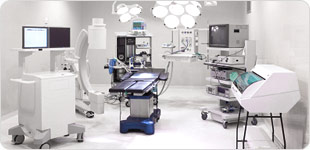Frequently Asked Questions About Hernias
- What is a Hernia?
- What are the Symptoms of a Hernia?
- What Causes Hernias?
- How are Hernias Treated?
- My Hernia Isn't Bothering Me. Do I Still Need Hernia Surgery?
- Is Hernia Surgery Urgent?
- I Had My Hernia Fixed Once, Why Has It Come Back?
- Can You Repair A Hernia If It Recurs?
- Can You Combine My Hernia Repair With Another Type Of Surgery?
- How Can I Tell If I Have Rectus Diastasis?
- How Does Rectus Diastasis Affect My Hernia Surgery?
- Will I Feel Pain After Hernia Surgery?
- How Long Is Hernia Surgery Recovery?
- How Long Will I Need To Take Off Work For Hernia Surgery?
- What Can You Eat After Hernia Surgery?
- When Can You Work Out After Hernia Surgery?
- How Much Does Hernia Surgery Cost?
What is a Hernia?
A hernia occurs when fatty tissue or an organ pushes through an opening the fascia (the layer of tissue overlying the muscle), the most common hernias occur in the abdomen, but they can also happen in the belly button, upper thigh and groin area.
The most common hernias are protrusions through a weak spot in the abdominal wall. Organs from the abdominal cavity, such as the intestines, push through the opening in the wall of the abdomen and create a bulge.
The abdominal wall is a sheet of tough muscle and tendon that runs from the ribs down to the legs. One of its primary functions is to hold the abdominal contents, primarily the intestines, in place.
If a weakness occurs in the abdominal wall, for whatever reason, then the organs behind the wall will simply push through the opening, creating a bulge that is often quite visible against the skin. This is the hernia.
The opening in the layer of tissue that is supposed to contain the protruding organ is called the “hernia orifice.”
The innermost lining of the cavity that contains the organ as it pushes through the hernia orifice is called the “hernia sac.”
Doctors will describe the size of your hernia both by the dimensions of the hernia orifice and the volume of the distended hernia sac.1
What are the Symptoms of a Hernia?
Hernia symptoms and signs vary not just from person to person, but also depending on the type or location of the hernia. The most common hernia symptoms are:
Protruding bulge
This is the most common and noticeable symptom of a hernia. Depending on the type of hernia, a bulge may be seen in the groin, near the belly button (umbilicus), or near the site of a previous surgery.
Pain
Pain from a hernia can vary from occasional to acute. The pain may be localized (in a specific area), referred (traveling along nerves near the hernia site), or generalized (this may be a sign of a strangulated hernia).
Pain from the creation of the hernia will usually lessen in a week or two, but your hernia will remain. Hernias do not self-repair.
Additional symptoms of a hernia may include:
- Nausea
- Vomiting
- Constipation
- Numbness
- Urinary Difficulties2
What Causes Hernias?
Hernias can happen to anyone: men, women, children, even babies, as some of us are born with congenital hernias.
The abdominal wall provides strong support for the internal organs, which are constantly exerting significant outer pressure. A gap can open in the tissue of the abdominal wall of its own accord at a point of natural weakness, or because it is over-stretched. Over-exertion or heavy lifting can cause a gap to open, but so can something as simple as a cough or sneeze.
Some things can increase your risk of hernia, including
- Obesity
- Pregnancy
- Age
- Tobacco use
- Disorders of the connective tissues (for example, the genetic disorder, Marfan's Syndrome)
- Chronic coughing
- Chronic constipation
- A family history of hernias
- Prior abdominal surgery
- Diabetes Mellitus
How are Hernias Treated?
The only way to treat a hernia is through hernia repair surgery.
My Hernia Isn't Bothering Me. Do I Still Need Hernia Surgery?
The short answer to this question is, Yes. If a hernia is not causing you pain or other symptoms, your doctor may recommend a “watch and wait” approach at first. However, a hernia can't repair itself, and eventually surgical hernia repair will be necessary to reduce the risk of dangerous or even life-threatening complications.
Is Hernia Surgery Urgent?
In many cases, it is possible to plan ahead for hernia surgery. However, there are some cases where hernia repair is urgent. If a hernia is causing considerable pain or if it has become incarcerated or strangulated, urgent repair is necessary.3
If you experience the following symptoms, you should seek emergency medical attention:
- Severe pain at the hernia site
- Swelling or redness
- Your hernia bulge is growing quickly
- Fever
I Had My Hernia Fixed Once, Why Has It Come Back?
Unfortunately, hernias do sometimes come back. This is called hernia recurrence. Hernia recurrence is more common with some types of hernias, but there is an overly 10% risk of any recurrence after a hernia is surgically repaired.4
There are a number of reasons a hernia may recur:
- Infection
- Underlying fascia weakness
- Insufficient patching of an initial hernia with overlay mesh
Hernia recurrence can't be totally avoided. Still, working with an experienced hernia doctor such as the surgeons at Hernia Center Los Angeles can greatly reduce the likelihood that a hernia will come back.
Can You Repair A Hernia If It Recurs?
Yes. Our surgeons frequently perform hernia revision surgery to repair recurrent hernias. They have performed thousands of hernia revision surgeries, many of them complex, and have an extremely high success rate, so that if you have hernia surgery here, it is very unlikely that your hernia will recur.
Yes. Our surgeons frequently perform hernia revision surgery to repair recurrent hernias. They have performed thousands of hernia revision surgeries, many of them complex, and have an extremely high success rate, so that if you have hernia surgery here, it is very unlikely that your hernia will recur.
Can You Combine My Hernia Repair With Another Type Of Surgery?
If you are a good candidate for additional procedures, your hernia surgery could be combined with another type of abdominal surgery. In some cases, there is extra fat and skin hanging off the abdomen. If an open hernia repair is to be performed, it is a perfect time to remove it. In some cases, the overhanging fat and skin may cause rashes and other health concerns, and may be covered by insurance. A tummy tuck is performed with our board-certified plastic surgeon working together with our hernia specialist for the best possible cosmetic and functional outcome.
How Can I Tell If I Have Rectus Diastasis?
Rectus diastasis is a split between the two rectus muscles that are normally located vertically in the center of the abdomen, called the "six pack". Over time, or with pregnancy, the muscle can become split, causing the abdomen to bulge.5
You can tell if you have a rectus diastasis with a few simple tests. First, lie down. Then bring your head and shoulders a few inches off the floor. You can feel your muscles on either side of your belly button - they should be together. If you feel a gap there, then the muscles have split, and you have a rectus diastasis. If the split is wide enough that your abdomen actually bulges as you do a small sit up, then the diastasis should be repaired as it will get worse over time and has become "non-functional".
Second, at the end of the day, attempt to "pull in" your stomach. If the top near your ribs flexes, but the lower part continues to bulge, this may also be from a rectus diastasis.
How Does Rectus Diastasis Affect My Hernia Surgery?
Hernias down the center of the abdomen are often accompanied by an overall abdominal bulge. This bulge worsens toward the end of the day and cannot be pulled in, no matter how much you try. The bulging is caused by a muscle split which has occurred over time, called a rectus diastasis (see How can I tell if I have rectus diastasis?)
At the Hernia Center Los Angeles, we repair not only the hernia, but the entire rectus diastasis defect. It is our belief that the repair of the rectus diastasis is critical to a good outcome. Not only will it decrease the chance of a hernia recurrence, but will improve your core strength, stop post-pregnancy bulging due to abdominal wall laxity, and create a flatter, more functional muscular abdomen.
Will I Feel Pain After Hernia Surgery?
Pain can be expected after any surgical procedure, and hernia surgery is no exception. Your hernia surgeon will prescribe medication for your pain, which should resolve over the next week. If you feel that your pain is excessive or is continuing too long, don’t hesitate to contact your doctor for a follow-up visit so that you can be examined and appropriate measures can be taken to control your discomfort.
How Long Is Hernia Surgery Recovery?
The length of time it takes to recover from hernia surgery depends on many factors, including the type of hernia repair performed, whether the hernia was strangulated or incarcerated, and the patient’s general health. When you attend your consultation with your hernia surgeon, you will receive detailed expectations for the recovery period.
How Long Will I Need To Take Off Work For Hernia Surgery?
Hernia surgery recovery times vary according to the procedure performed, and each patient recovers at their own rate. It is important to be patient with the recovery process, and give your body the time it needs to heal. Your doctor will give you expectations about when you should be able to get back to work after your procedure, but you can expect you’ll need at least one week off.
What Can You Eat After Hernia Surgery?
On the day of your hernia surgery, you may feel nauseated from the anesthesia. Be sure to drink plenty of water, and try to get some nutrition in, even if it’s just with clear liquids like brother soup. Once your stomach is no longer upset, you will be free to resume your regular diet.
When Can You Work Out After Hernia Surgery?
You will be encouraged to begin walking, at least for short distances around your home, immediately after your hernia surgery. Your hernia doctor will ask you to refrain from exercise and other strenuous activities for 4-6 weeks so that your body has time to heal.
How Much Does Hernia Surgery Cost?
Hernia repair is considered to be a medically necessary procedure, so your surgery should be covered by your medical insurance.
Contact Us
If you have been diagnosed with a hernia, you probably have many questions. Please contact us at Hernia Center Los Angeles to schedule a consultation with an experienced hernia doctor you can trust.
2 National Library of Medicine. Hernia. Available: https://medlineplus.gov/ency/article/000960.htm. Accessed May 9, 2023.
3 American Society of Anesthesiologists. Hernia Surgery. Available: https://www.asahq.org/madeforthismoment/preparing-for-surgery/procedures/hernia-surgery. Accessed May 9, 2023.
4 Cleveland Clinic. Hernia. Available: https://my.clevelandclinic.org/health/diseases/15757-hernia#outlook--prognosis. Accessed May 9, 2023.
5 Cleveland Clinic. Diastasis Recti. Available: https://my.clevelandclinic.org/health/diseases/22346-diastasis-recti. Accessed May 9, 2023.



